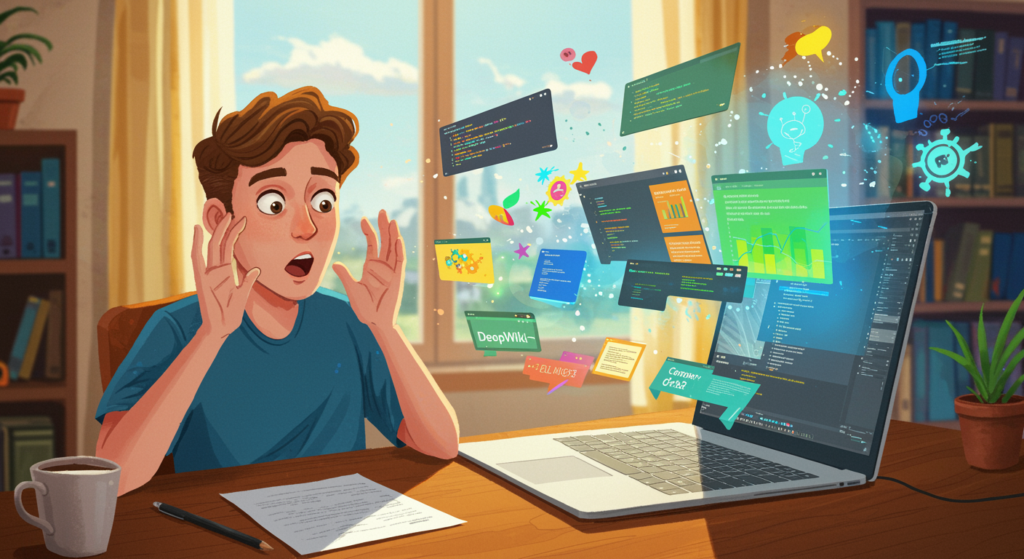
DeepWiki: AI-Powered Tool for Understanding GitHub Repositories
Revolutionizing Code Understanding with DeepWiki
Imagine diving into a GitHub repository only to face a tangle of code without clear guidance—it’s a frustration many developers know all too well. DeepWiki changes this by instantly converting any public repository into an interactive, AI-driven documentation hub. Launched on April 25, 2025, by Cognition AI, the creators of the popular AI coding assistant Devin, DeepWiki makes exploring codebases straightforward and insightful.
By swapping “github” with “deepwiki” in a repository URL, you unlock a wealth of AI-generated insights. This tool has already tackled over 30,000 repositories and sifted through more than 4 billion lines of code, backed by a substantial $300,000 investment in computing power. What sets DeepWiki apart is its ability to bridge the gap between raw code and real understanding, empowering developers to work smarter and faster.
Exploring the Core of DeepWiki
DeepWiki acts like a personal AI encyclopedia for GitHub repositories, automatically crafting structured documentation that breaks down complex code into digestible explanations. It’s akin to having an experienced developer explain everything from high-level architecture to specific implementation details in everyday language.
Unlike static docs that sit unused, DeepWiki offers dynamic, interactive features where you can ask questions in natural language. Whether you’re new to a project or refining your knowledge, this tool turns code exploration into a conversation, making it easier to grasp the bigger picture.
The Tech Behind DeepWiki’s Magic
At its heart, DeepWiki relies on advanced large language models to scan repository files, including code, READMEs, and configs. It doesn’t just summarize; it uncovers connections between components, generates visual aids, and answers targeted queries about how things work.
This approach goes beyond basic analysis, helping you visualize system interactions and understand design choices without hours of manual digging. Have you ever wished for a smarter way to decode unfamiliar code? DeepWiki delivers exactly that, turning potential headaches into productive sessions.
Standout Features of the DeepWiki Platform
Seamless Automatic Documentation
One of DeepWiki’s key strengths is its ability to generate thorough documentation on the fly, covering everything from core functionalities to tech stacks and file structures. No manual effort required—it pulls apart the codebase to explain modules, dependencies, and best practices in clear terms.
This feature alone can save developers hours, as it highlights how different parts of the code interconnect. For instance, if you’re reviewing an open-source library, DeepWiki might outline implementation notes that reveal hidden efficiencies you could apply to your own projects.
Interactive Visual Tools
Visualizing code architecture can make all the difference in grasping complex systems quickly. DeepWiki excels here by creating interactive diagrams, such as flowcharts and dependency graphs, that bring abstract concepts to life.
These visuals help you see the relationships between modules at a glance, cutting down the time needed to map out a repository mentally. Think about how this could speed up your workflow—suddenly, debugging or planning enhancements becomes far less intimidating.
AI-Driven Conversations
DeepWiki’s conversational AI is a game-changer, letting you pose questions like “How does this authentication flow work?” and get precise, context-rich responses. It draws from a deep analysis of the repository to provide code snippets, explanations, and even setup advice.
This interactive element feels like chatting with a knowledgeable colleague, making it ideal for troubleshooting or learning on the spot. For example, if you’re exploring a new framework, you could ask about design patterns and receive tailored insights immediately.
In-Depth Research Capabilities
When you need more than surface-level info, DeepWiki’s “Deep Research” mode dives deeper to tackle intricate questions about code optimizations or architectural decisions. It’s like accessing expert-level guidance without leaving your desk.
This mode uncovers the “why” behind the code, helping you understand not just what it does, but why it was built that way. Developers often use this for refining projects or spotting potential improvements, turning exploration into actionable knowledge.
How DeepWiki Enhances the Developer Journey
Streamlining Onboarding and Skill-Building
Getting up to speed on a new project can feel overwhelming, but DeepWiki shortens that process by offering instant overviews of repository structures and functions. New team members can dive in without needing extensive tutorials, boosting team efficiency right away.
Imagine joining a large-scale project and quickly understanding its core components—DeepWiki makes that a reality, reducing reliance on senior developers for basic explanations. This not only saves time but also fosters a more independent learning environment.
Fostering Better Open Source Engagement
Open source projects often lack detailed docs, which can deter potential contributors. DeepWiki lowers these barriers by providing easy-to-access insights, encouraging more people to participate and innovate.
For contributors, this means spotting contribution opportunities faster, like identifying bugs or enhancement areas. It’s a win for the community, as it promotes collaboration and knowledge sharing across diverse projects.
Boosting Code Quality and Upkeep
With DeepWiki’s detailed analysis, teams can pinpoint code patterns, potential flaws, and optimization chances more effectively. Its natural language explanations make it simpler to maintain consistency and high standards in large codebases.
This tool helps in conducting thorough code reviews, where you might discover overlooked best practices or inefficiencies. Over time, it leads to cleaner, more maintainable code, which is essential for long-term project success.
Practical Uses of DeepWiki in Real Scenarios
For Solo Developers
Individual developers can leverage DeepWiki to quickly assess new libraries, learn from established code patterns, or troubleshoot dependencies without getting bogged down. It’s perfect for experimenting with alternative implementations in your own work.
For instance, if you’re integrating a third-party API, DeepWiki could explain its setup in minutes, saving you from trial-and-error frustrations. This targeted approach keeps your projects moving forward smoothly.
For Teams and Organizations
Development teams find DeepWiki invaluable for accelerating onboarding, ensuring knowledge flows seamlessly in remote setups, and minimizing reliance on informal expertise. It also streamlines code reviews by providing clear, AI-generated context.
In a team setting, this means faster decision-making during architectural discussions, as everyone has access to the same detailed insights. It’s especially useful for distributed groups, where consistent understanding is key to productivity.
In Learning and Education
Educators and students can use DeepWiki to explore real-world codebases with guided explanations, bridging the gap between theory and practice. It’s an excellent resource for studying software design or analyzing industry examples.
For students, this tool turns abstract concepts into tangible lessons, like dissecting a popular repository to see how theoretical patterns are applied. What better way to build practical skills than through interactive, AI-assisted learning?
Starting Out with DeepWiki
Easy Access Steps
Getting started with DeepWiki is straightforward: just modify a public GitHub URL by replacing “github” with “deepwiki,” and you’re in. For example, turn https://github.com/username/repo into https://deepwiki.com/username/repo for instant access.
This simple process integrates seamlessly with your existing habits, requiring no extra tools or accounts. It’s designed for developers of all levels, making advanced code insights available at your fingertips.
Accessibility and Options
DeepWiki is free for public repositories, opening up AI-powered analysis to everyone. For private ones, paid plans offer the same benefits, catering to businesses that need secure code reviews.
This flexibility ensures that whether you’re working on personal projects or enterprise-level systems, DeepWiki adapts to your needs without barriers.
The Innovative Tech Powering DeepWiki
DeepWiki’s capabilities stem from a blend of advanced code parsing, specialized large language models, knowledge graphs, and natural language processing. Cognition AI has poured resources into this, including over $300,000 in compute for initial analyses.
This combination allows DeepWiki to handle diverse codebases efficiently, providing insights that feel tailored and relevant. It’s a testament to how AI is evolving to support everyday development challenges.
What’s Next for DeepWiki and Code Tools
Future Integrations in Development
As tools like DeepWiki evolve, we might see them embedded in IDEs or CI/CD pipelines, offering real-time documentation updates. This could transform how teams collaborate on code changes.
Imagine automated docs that refresh with every commit—it’s an exciting possibility that could make codebases even more manageable.
Expanding Beyond GitHub
While focused on GitHub now, DeepWiki’s tech could extend to other platforms, creating a universal way to understand code across ecosystems. This broader reach would benefit developers working in varied environments.
Such expansions might include support for different version control systems, further streamlining global development efforts.
Building Collaborative Features
Upcoming versions could add team annotations or shared insights, letting users enhance AI-generated docs collectively. This would foster deeper collaboration on complex projects.
By involving more voices, DeepWiki could become an even more powerful tool for community-driven innovation.
Wrapping Up: Embracing DeepWiki for Better Code Insights
DeepWiki marks a pivotal shift in how we approach code documentation, turning repositories into engaging, queryable resources that tackle the common pain of deciphering unfamiliar code. For developers everywhere, it’s a reliable ally in boosting productivity and fostering creativity.
Whether you’re an individual coder, part of a team, or an educator, DeepWiki opens up new ways to learn and contribute. What are your experiences with AI tools like this? We’d love to hear your thoughts in the comments, or explore more on how AI is reshaping development in our related posts.
Ready to try it out? Head over to a repository and give DeepWiki a spin—your coding journey might just get a whole lot easier.
References
For more details on DeepWiki and its features, check out these sources:
- DeepWiki Overview on Apidog
- Devin AI Introduces DeepWiki on MarkTechPost
- DeepWiki Guide on DEV Community
- AIbase News Article 17547
- AIbase News Article 17577
- Blog Post Writer Repository on GitHub
- Daily.dev Post on DeepWiki
- SEO Writing Tips on GravityWrite
DeepWiki, GitHub repositories, AI documentation, Cognition AI, code understanding, developer tools, interactive code analysis, AI-powered coding, repository exploration, software development efficiency







